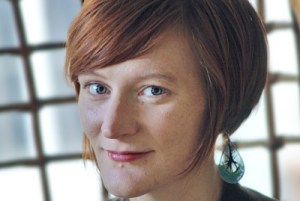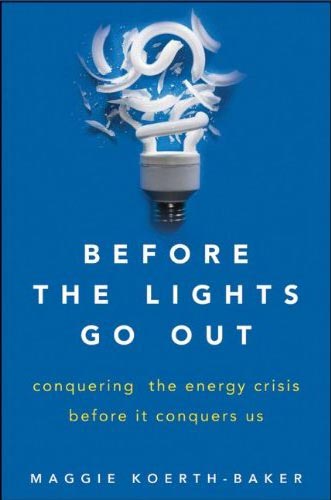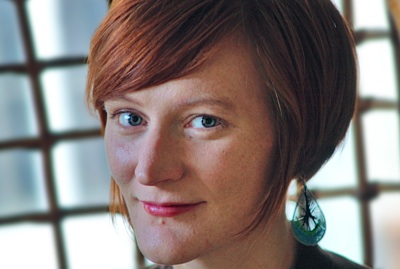 Maggie Koerth-Baker is the science editor at BoingBoing, the popular group-blog where she gets to link to stories about booze-based semiconductors or the science of farting. But her writing has always displayed two traits that give it power far beyond BoingBoing’s geeky precincts: She’s got a knack for explaining really complex science in an unintimidating way, along with a hardheaded Midwestern pragmatism that’s tough to dismiss.
Maggie Koerth-Baker is the science editor at BoingBoing, the popular group-blog where she gets to link to stories about booze-based semiconductors or the science of farting. But her writing has always displayed two traits that give it power far beyond BoingBoing’s geeky precincts: She’s got a knack for explaining really complex science in an unintimidating way, along with a hardheaded Midwestern pragmatism that’s tough to dismiss.
She brings both those qualities to Before the Lights Go Out: Conquering the Energy Crisis Before it Conquers Us, her new book about the choices we face in continuing to power our world without wrecking it. It’s a fast, filling read that will arm you with a deeper understanding of the precariousness of our electricity grid, the distinction between efficiency and conservation, and the pros and cons of each of the energy sources we imagine as our savior. Koerth-Baker plants herself firmly in the climate-activist camp, but she knows how to talk across the political divide, and, refreshingly, her perspective is rooted in the heartland and draws examples from places like Kansas and Minnesota more than California and New York.
We’ve got an excerpt of Before the Lights Go Out for you, which looks at the relative importance of individual choice and policymaking in reforming our energy system. I collared Koerth-Baker via email to answer some questions the book raised for me about the climate debate, the possibility of dialogue, and the tenuousness of hope.
Q. You begin with the story of the Kansan who declares “climate change is a lie” yet who drives a hybrid and has swapped out all his incandescent bulbs for compact fluorescents. Many of us have spent a lot of time trying to argue with climate deniers. Do you think we should just give that up? Is it really possible to take care of our climate crisis without persuading people that it exists?
A. No. I don’t think we should give up talking about climate change and trying to help more people understand and accept it. This is important science. Based on everything we know, it represents a very real threat to our way of life, and in fact, to our lives.
That said, I think we are thinking about this the wrong way in some respects. We can’t wait until we’ve convinced everyone that climate change is happening before we start taking energy action, and we don’t have to. What I think that story with the man from Kansas illustrates is that there is common ground that we can find and work with. It doesn’t mean we stop talking about climate change, but it does mean that we start approaching people who aren’t listening when we talk about climate and, instead, find the things we can agree on when it comes to energy. You can do both at the same time, and I think we should.
I also think that we — and, by that, I mean the segment of the media that pays a lot of attention to energy and climate issues — spend too much time attacking, debunking, and arguing with people who aren’t going listen because they have other agendas driving their decision making. Instead, I think we would do better to focus more of our efforts on creating bridges to communities and individuals who are more on the fence about this stuff.
There are plenty of people who say they don’t believe in climate change now, but who are aware of changes happening and if we help them to better understand the science, there’s more of a chance of them accepting this reality. I think that constructive approach is more likely to work than if we keep putting all our energy into yelling down (or complaining to the choir about) people like James Inhofe.
Q. You write early on, “This isn’t a book about quick fixes,” argue there’s “no killer app” for renewable energy, and suggest that any sane path forward is going to involve a complex mix of new policies, technologies and systems. (I kept thinking of Clay Shirky’s line about the future of the media business: “Nothing will work, but everything might.”) How do we get there from here, when “here” is where so many Americans still think politicians can lower the price of gas — or that lower gas prices are a good thing?
A. That is a difficult question. And I don’t think there is a clear answer. But in the course of doing this research, I have come to the conclusion that part of the answer must involve some method of putting a price on carbon — precisely because that carbon is valuable.
We’ve become dependent on fossil fuels for a reason — not because of any evil plot, but because these fuels are just that much more powerful than anything that came before them. The power of coal, the portability of liquid gasoline: There is amazing value there. At the same time, we’re also talking about fuels we have limited supplies of. And those fuels, when we use them, also cost us money in the form of health-care costs and climate change adaptation costs.
Right now, the price we pay for those fuels doesn’t really account for either the amazing benefits or the awful limitations. It’s an artificial price, based on simple, direct supply and demand. It doesn’t take the long term into account. It doesn’t take economy-wide effects into account.
If we valued fossil fuels at what they are really worth to us, then a lot of the other stuff would fall into place. That mixture of technologies and policies would happen faster, and more naturally, because it would be based on a natural incentive.
It’s reasonable for people to not want to spend half their paycheck on a fuel that is absolutely necessary to their life. But paradoxically, if we had a price on carbon, and the cost of those fuels went up, then businesses and governments and individuals would find ways to get people the services they needed at a lower cost. Right now, there’s not enough of an incentive for that.
Q. You make the point (in this excerpt from the book, for instance) that energy is a big “shared system” that isn’t going to change based on individual choices but needs to be reformed at the level of policy. That makes a lot of sense to me, but it’s also pretty depressing, since I can control my own choices but I’m pessimistic about the policies we’re likely to get from Washington. How do you keep despair at bay?
A. It is a bit depressing. Realizing the scale of problem we’re dealing with, and the complexity of the solution we have to create, really did make me a lot more pessimistic than I was when I started researching this book. Even if you have the political willpower, you’re still talking about a huge undertaking, bigger and more complicated than anything we’ve tried before.
Changing the way we use energy is often compared to the Apollo Project, but it’s actually broader than that. A price on carbon would make it easier, but it’s still complicated. And you still have to think about the far future even as you’re making changes to make the present better.
The good news is that there is a role for individual choices, just not the one we’ve imagined. Your individual choices don’t matter … unless there is some mechanism linking them to other people’s individual choices. This is why programs that tell you whether you’re using more or less energy than your neighbors are good. They link choices together and help people to start making changes (and larger changes) en masse. And that’s why a price on carbon helps, too. Because it naturally encourages people to make changes all together, and those changes are simple-to-understand … you’d just find ways to do things cheaper, and that would be the right decision.
Individual choices are also part of their own system — a cultural system. I noticed this when I was researching what the U.S. military, and particularly the Navy and Air Force, has done about energy. They’re on the forefront of this stuff. And it’s not just about alternative fuels. There are some massive changes happening in how military culture thinks about energy use, and it’s leading to large-scale efficiency and conservation.
On the surface, this looks like a very top-down thing. It looks like something dictated from the generals. But it’s more complicated than that. If you look at the history, what you see is an interaction between bottom-up and top-down enabling one another. Individuals made a case for energy change as a practical thing, which would fit the mission and solve some serious problems. The people at the top made a few changes, and those changes ended up changing not just what the people at the bottom did, but also how they thought about energy. As more soldiers and sailors and airmen became energy conscious, they’ve pushed for more changes, and that (combined with proven results) has led to more top-down action, and more bottom-up cultural shifts.
The key, though, is that the original bottom-up agents of change didn’t start out thinking about what they could do at home by themselves. And they didn’t approach the problem by taking sides or asking other people to take sides. Instead, they started out by looking at how large-scale changes would benefit everyone, and they worked to get some of those implemented.



